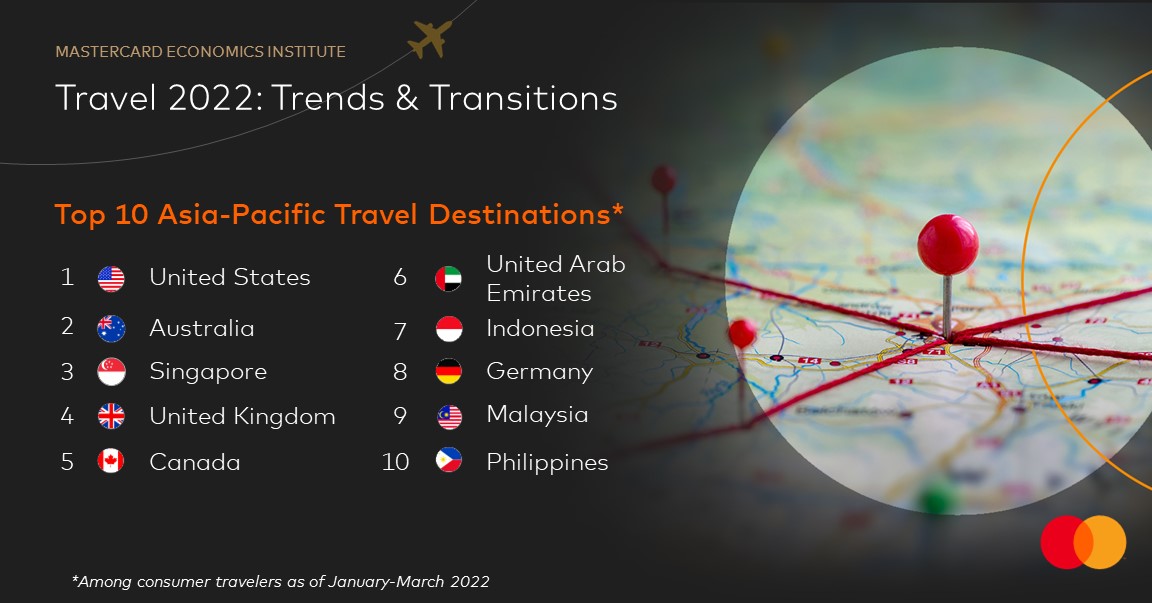For the first time since the pandemic, global leisure and business flight bookings surpassed pre-pandemic levels, while spending on cruise lines, buses and trains saw sharp improvements this year, signalling a key milestone in the global travel recovery.

For the first time since the pandemic, global leisure and business flight bookings surpassed pre-pandemic levels, while spending on cruise lines, buses and trains saw sharp improvements this year, signalling a key milestone in the global travel recovery, according to new research on global travel conducted by the Mastercard Economics Institute.
Spanning 37 markets across the globe and nine markets in the Asia Pacific, the 'Travel 2022: Trends and Transitions' report delivers critical insights about the global state of travel in a less restricted, post-vaccine chapter of the pandemic era.
According to the analysis, if flight booking trends continue at the current pace, an estimated 430 million more passengers will fly in the Asia Pacific compared to last year.
The travel outlook for the region is optimistic, even with markets across North Asia and mainland China yet to relax border measures. This will likely be felt across the entire region and world.
Following two years of little to no travel for the Asia Pacific in 2022, the loosening of travel restrictions and reopening of borders has sparked a surge in demand for both inbound and outbound travel.
A trend observed in markets across the region is the release of excess savings for travel. In 2022, borders opened in Australia, resulting in a sudden ability to travel. Flight bookings from Australia to Indonesia, for example, spiked nearly 200 per cent in 2022, and flights to the US more than doubled.
Globally, for most of the year, international tourists were seen spending more on experiences than things when travelling.
This trend was also witnessed in Asia, where Singapore recorded one of the highest international tourism spends on experiences globally, with a 60 per cent increase in spending from pre-pandemic levels through March 2022.
However, other markets across the region revealed a more mixed picture, with low levels of inbound tourism seen in Indonesia and South Korea, whose borders opened in April 2022. This will be an important trend to watch for the rest of the year as ongoing travel restrictions across the region are gradually lifted, and Asia Pacific tourists begin to shop and spend abroad.
Since the onset of the pandemic, trends reveal that people have been favouring travel destinations that are less complex to navigate amidst confusing entry and quarantine requirements, travel restrictions, and testing procedures.
The US remains the most popular choice for Asia Pacific travellers, followed by Australia, Singapore, the UK, and Canada. In the months to come, however, this trend is likely to shift in favour of intra-regional travel as restrictions are relaxed and domestic travel picks up once again.
The research also found that the cost of travel remains elevated across the region due to supply chain disruption and higher operating costs. Travel deficits triggered by the pandemic have expanded the operating expense burden for airlines and the broader transportation industry, resulting in higher fares for travellers in the Asia Pacific compared to their global counterparts.
Domestic ground travel has seen a robust demand in many Asia Pacific markets where road trips have retained appeal. Fuel spending has steadily increased in Singapore, Hong Kong, The Philippines, and Australia, whilst public transportation and cruise lines have also firmly stepped back onto the road to recovery after an initial slow start due to group travel restrictions.
“Despite a delayed recovery and numerous risks such as inflation impacting discretionary spending, travellers in the Asia Pacific have demonstrated a strong desire to return to travel,” said David Mann, Chief Economist, Asia Pacific and Middle East Africa of the Mastercard Economics Institute.
“2022 will prove to be a significant year for the travel industry in the Asia Pacific. As border restrictions relax, we have witnessed an accelerated return to travel that indicates cause for optimism, with the region poised to catch up with the rest of the world swiftly.” — VNS





